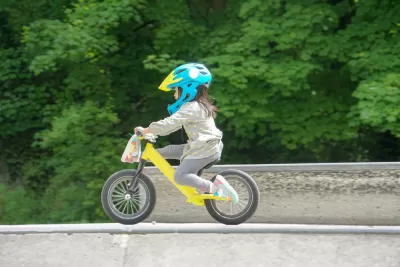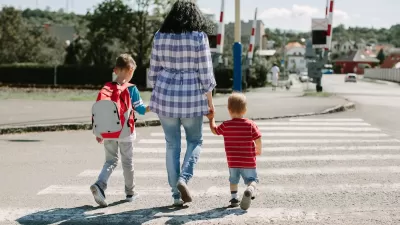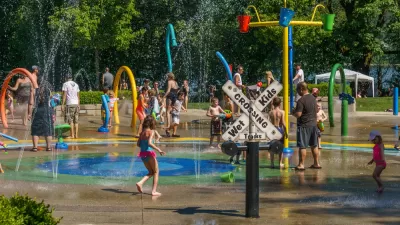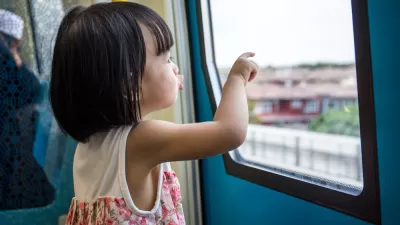Designing neighborhoods with children in mind could reduce traffic fatalities and improve the health and well-being of kids.

"Kids today aren’t lazy," argues Scott Berson. "They aren’t addicted to screens, at least not any more than adults. But the way we’ve built our modern environment restricts, with almost authoritarian precision, the ability of kids to do anything independently — including play outside."
Berson argues that our built environment traps kids in car-dependent, sedentary lifestyles, "About 52% of families say they live in suburbs, though this definition is a little hazy. Let’s think of the suburb as a car-focused area, usually on the outskirts of a larger city, with houses separated from offices separated from stores by miles and miles of roads. There are few sidewalks, and few bike trails or lanes. There is no real bus or transit system." These environments, Berson says, are "agonizingly boring to kids — and an area in which it is impossible for them to act on their need to 'try out' independence as they get older." It's impossible to exercise independence in "an environment designed to be driven and only to be driven." Meanwhile, despite the perception of suburban safety, "[t]raffic deaths — and child fatalities — are far more common in suburbs than in cities."
Berson believes "[w]e need to think of kids as full members of society and we need to design our neighborhoods for kids to have full, rich childhoods that let them grow into well-rounded members of our communities." He recommends three "simple to remember, but agonizingly difficult to implement" actions: "Connect the streets, mix the uses, and shrink the schools." Berson describes steps that cities can take to work toward these goals. "It will take creative thinkers and public leaders across the nation to begin to see the harm the environment we’ve built is doing to kids, and it will take bravery to implement even small changes."
FULL STORY: Op-Ed: Why Bad City Design is Failing Our Kids (And What to Do About It)

Alabama: Trump Terminates Settlements for Black Communities Harmed By Raw Sewage
Trump deemed the landmark civil rights agreement “illegal DEI and environmental justice policy.”

Study: Maui’s Plan to Convert Vacation Rentals to Long-Term Housing Could Cause Nearly $1 Billion Economic Loss
The plan would reduce visitor accommodation by 25% resulting in 1,900 jobs lost.

Planetizen Federal Action Tracker
A weekly monitor of how Trump’s orders and actions are impacting planners and planning in America.

Wind Energy on the Rise Despite Federal Policy Reversal
The Trump administration is revoking federal support for renewable energy, but demand for new projects continues unabated.

Passengers Flock to Caltrain After Electrification
The new electric trains are running faster and more reliably, leading to strong ridership growth on the Bay Area rail system.

Texas Churches Rally Behind ‘Yes in God’s Back Yard’ Legislation
Religious leaders want the state to reduce zoning regulations to streamline leasing church-owned land to housing developers.
Urban Design for Planners 1: Software Tools
This six-course series explores essential urban design concepts using open source software and equips planners with the tools they need to participate fully in the urban design process.
Planning for Universal Design
Learn the tools for implementing Universal Design in planning regulations.
Caltrans
Smith Gee Studio
Institute for Housing and Urban Development Studies (IHS)
City of Grandview
Harvard GSD Executive Education
Toledo-Lucas County Plan Commissions
Salt Lake City
NYU Wagner Graduate School of Public Service





























